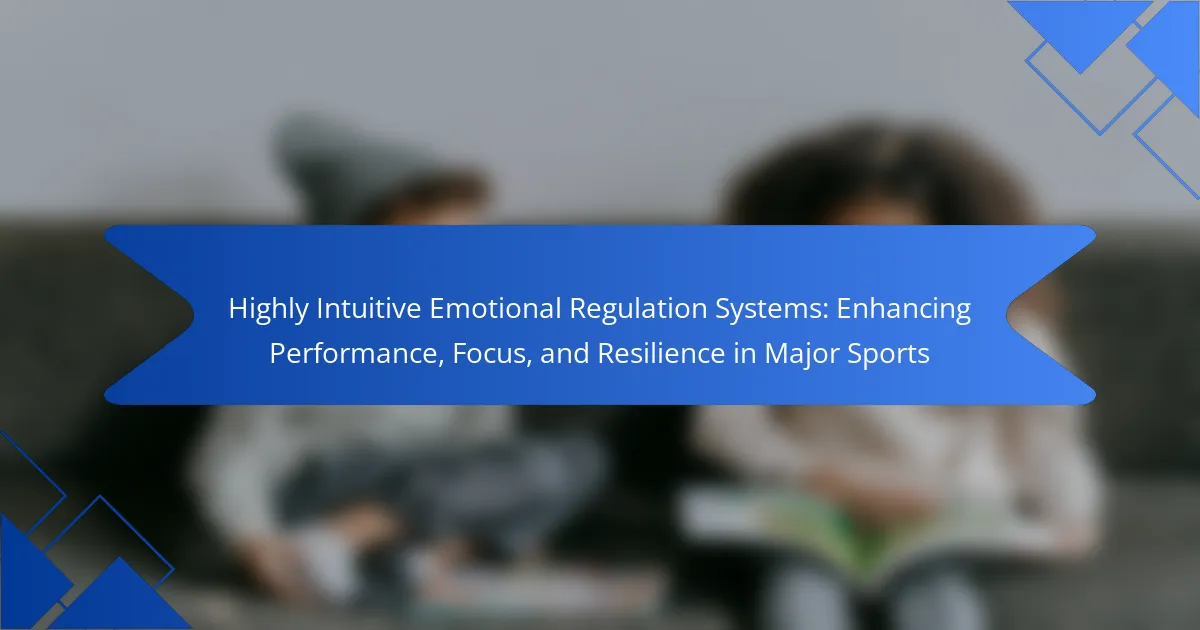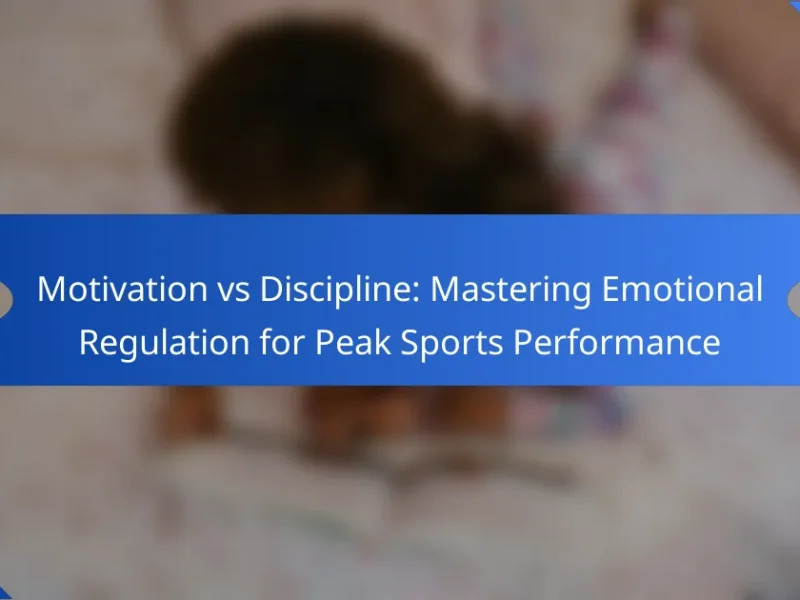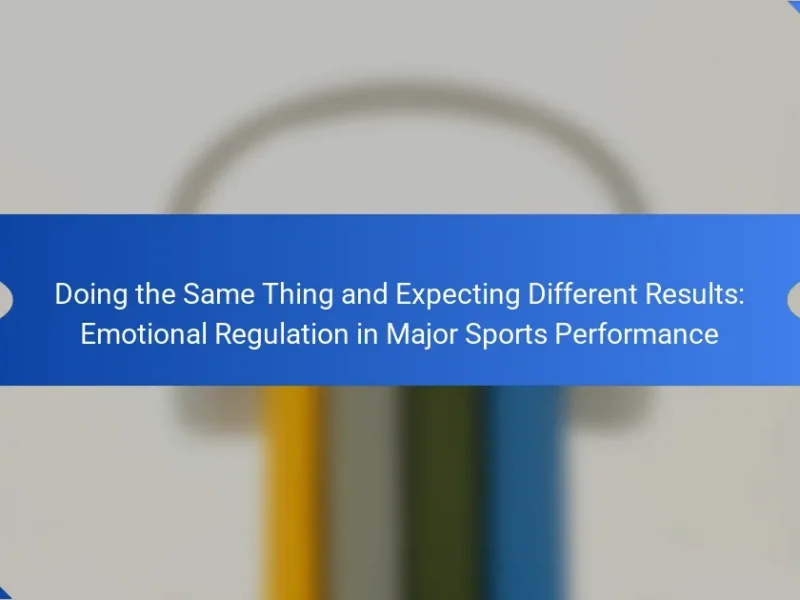Highly Intuitive Emotional Regulation Systems significantly enhance athletes’ performance by improving focus and resilience. These systems utilize mindfulness and emotional awareness to effectively manage stress. Key attributes include self-awareness and cognitive flexibility, which foster better decision-making. Implementing these systems through targeted training and feedback can lead to sustained athletic success.
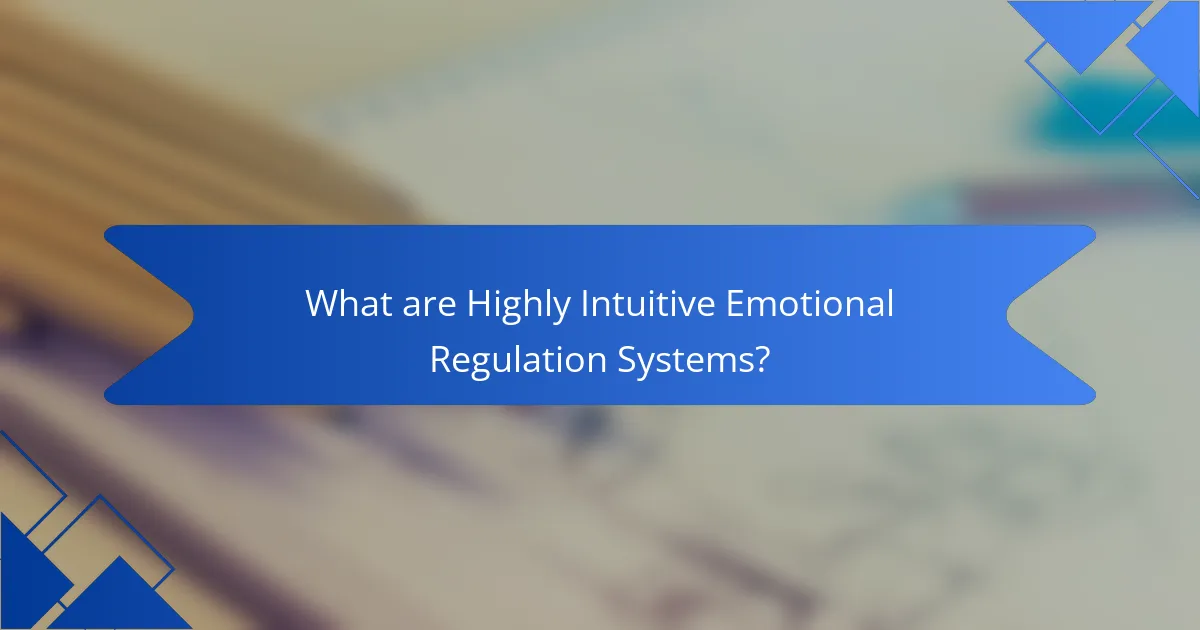
What are Highly Intuitive Emotional Regulation Systems?
Highly Intuitive Emotional Regulation Systems enhance athletes’ performance by improving focus and resilience. These systems utilize techniques such as mindfulness, cognitive restructuring, and emotional awareness to manage stress effectively. Research indicates that athletes employing these systems experience reduced anxiety levels, leading to better decision-making during competitions. Furthermore, the integration of these techniques fosters long-term mental health benefits, contributing to sustained athletic success.
How do these systems impact performance in major sports?
Highly intuitive emotional regulation systems significantly enhance performance in major sports by improving focus, resilience, and overall mental well-being. These systems help athletes manage stress and maintain optimal emotional states during competitions. Research indicates that athletes utilizing these systems exhibit better decision-making and increased adaptability under pressure. For instance, studies show a marked improvement in performance metrics when athletes engage in emotional regulation techniques. Additionally, these systems foster a positive mindset, which is crucial for long-term success in high-stakes environments.
What role does emotional regulation play in athlete focus?
Emotional regulation significantly enhances athlete focus by enabling better management of stress and distractions. This process allows athletes to maintain concentration during high-pressure situations, leading to improved performance. Effective emotional regulation systems help athletes develop resilience, adapt to challenges, and sustain motivation. Research indicates that athletes with strong emotional regulation skills often experience higher levels of focus and performance consistency, particularly in major sports. This unique attribute distinguishes successful athletes in competitive environments.
How can resilience be enhanced through emotional regulation?
Emotional regulation enhances resilience by enabling athletes to manage stress and maintain focus. Effective emotional regulation systems help athletes recover from setbacks and maintain optimal performance levels. Techniques such as mindfulness and cognitive restructuring allow for better emotional responses, fostering a resilient mindset. Research shows that athletes with strong emotional regulation skills exhibit improved performance under pressure, significantly boosting their resilience in competitive environments.
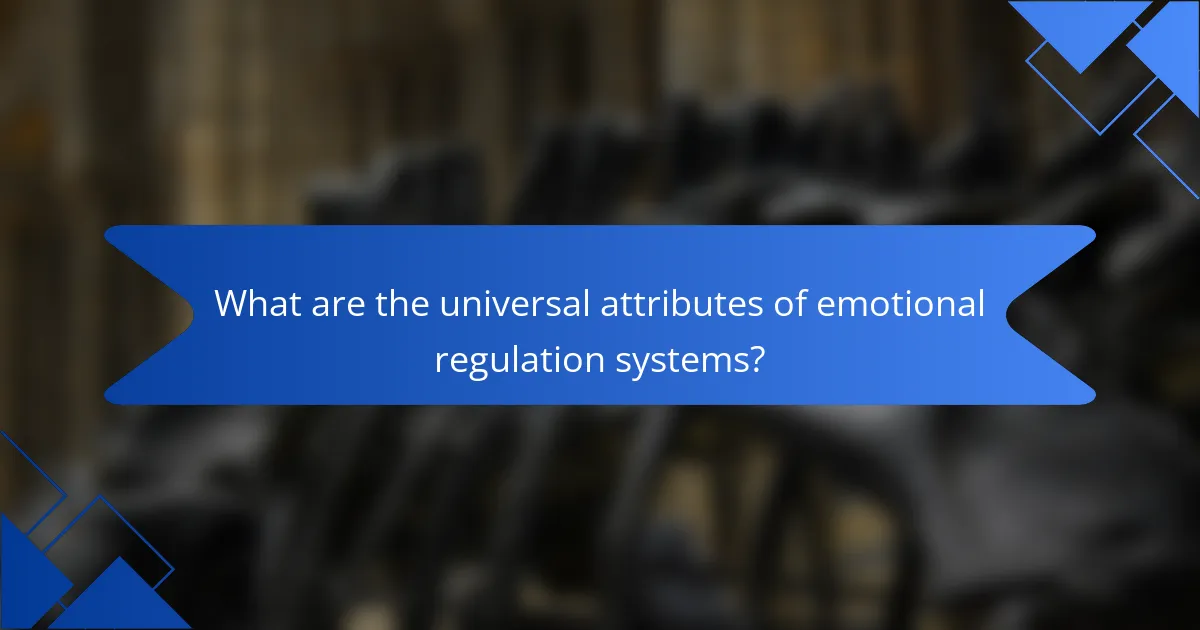
What are the universal attributes of emotional regulation systems?
Highly intuitive emotional regulation systems enhance performance, focus, and resilience in major sports through key universal attributes. These systems include self-awareness, allowing athletes to recognize their emotions; cognitive flexibility, enabling adaptive responses to stress; and emotional intelligence, fostering effective communication and teamwork. Additionally, they promote mindfulness, helping athletes maintain focus under pressure. These attributes work together to create a robust framework for managing emotions, ultimately leading to improved athletic performance.
How do athletes universally benefit from emotional regulation?
Athletes universally benefit from emotional regulation by enhancing their performance, focus, and resilience. Effective emotional regulation systems allow athletes to manage stress, maintain concentration, and recover from setbacks. Research shows that athletes with strong emotional regulation skills demonstrate improved decision-making and increased motivation during competitions. This ability to control emotions directly correlates with better performance metrics and overall mental well-being, leading to sustained success in major sports.
What common techniques are used across sports for emotional regulation?
Athletes commonly use techniques such as mindfulness, visualization, and breathing exercises for emotional regulation. These methods enhance focus, resilience, and performance under pressure. Mindfulness encourages present-moment awareness, helping athletes manage stress. Visualization allows them to mentally rehearse successful performances, boosting confidence. Breathing exercises regulate physiological responses, promoting calmness during competition. Each technique contributes uniquely to emotional stability, essential for high-stakes sports environments.

What unique attributes differentiate highly intuitive systems?
Highly intuitive emotional regulation systems stand out due to their unique attributes, such as adaptability, real-time feedback, and user-centric design. These systems enhance performance by tailoring strategies to individual emotional states, promoting focus through mindfulness techniques, and fostering resilience with proactive coping mechanisms. Their ability to integrate seamlessly into training regimens makes them indispensable for athletes seeking a competitive edge.
How do personalized emotional regulation strategies vary by sport?
Personalized emotional regulation strategies vary significantly by sport due to unique demands and performance contexts. In individual sports like tennis, athletes often focus on self-talk and visualization techniques to manage pressure. In contrast, team sports such as football emphasize collective emotional strategies, fostering team cohesion and support.
Athletes in contact sports, like rugby, may utilize aggression management techniques to channel emotions positively, while endurance athletes in sports like marathon running often rely on mindfulness practices to maintain focus over long distances. The effectiveness of these strategies is rooted in their alignment with the specific emotional challenges faced in each sport, enhancing performance, focus, and resilience.
Research indicates that tailored emotional regulation approaches can lead to improved outcomes, highlighting the importance of understanding the unique attributes of each sport and its athletes.
What innovative practices are emerging in emotional regulation?
Highly intuitive emotional regulation systems are emerging in sports, enhancing performance, focus, and resilience. These systems leverage technology and psychology to provide athletes with real-time feedback on their emotional states.
Innovative practices include biofeedback devices that monitor physiological responses, allowing athletes to adjust their emotional regulation strategies instantly. For instance, wearable technology can track heart rate variability, enabling athletes to identify stress levels and implement calming techniques effectively.
Another practice involves mindfulness training integrated into training regimens. Research shows that athletes who engage in mindfulness report improved emotional control and resilience under pressure. This unique attribute of emotional regulation fosters a mental edge in competitive environments.
Lastly, team-based emotional regulation workshops are gaining popularity. These sessions focus on collective emotional intelligence, enhancing team dynamics and performance. As a result, athletes develop stronger interpersonal skills and a shared understanding of emotional cues.

What rare attributes are found in advanced emotional regulation systems?
Highly intuitive emotional regulation systems exhibit rare attributes such as real-time adaptability, enhanced sensory awareness, and profound empathy. These attributes enable athletes to manage their emotions during high-pressure situations effectively. For instance, real-time adaptability allows for immediate adjustments in emotional responses based on situational cues, leading to improved performance. Enhanced sensory awareness helps athletes tune into their emotional states and those of their teammates, fostering better communication and teamwork. Profound empathy contributes to building strong connections with coaches and peers, enhancing overall resilience and focus in competitive environments.
What are the uncommon methods used by elite athletes?
Elite athletes often employ uncommon methods for emotional regulation to enhance their performance, focus, and resilience. Techniques include visualization, mindfulness meditation, and biofeedback.
Visualization allows athletes to mentally rehearse their performance, improving confidence and reducing anxiety. Mindfulness meditation fosters present-moment awareness, enhancing emotional control during competitions. Biofeedback utilizes technology to monitor physiological responses, enabling athletes to recognize and adjust their emotional states effectively.
These methods represent unique attributes of elite training regimens, differentiating successful athletes in high-pressure environments.
How do cultural influences shape emotional regulation practices?
Cultural influences significantly shape emotional regulation practices by promoting specific values and coping strategies. For instance, collectivist cultures emphasize group harmony, leading to emotional suppression, while individualistic cultures encourage personal expression. These practices enhance performance, focus, and resilience in major sports by aligning athletes’ emotional responses with cultural expectations. Athletes from different backgrounds may utilize unique emotional regulation techniques, such as visualization or mindfulness, reflecting their cultural frameworks. Understanding these influences allows coaches to tailor training methods that enhance emotional resilience and performance based on cultural contexts.
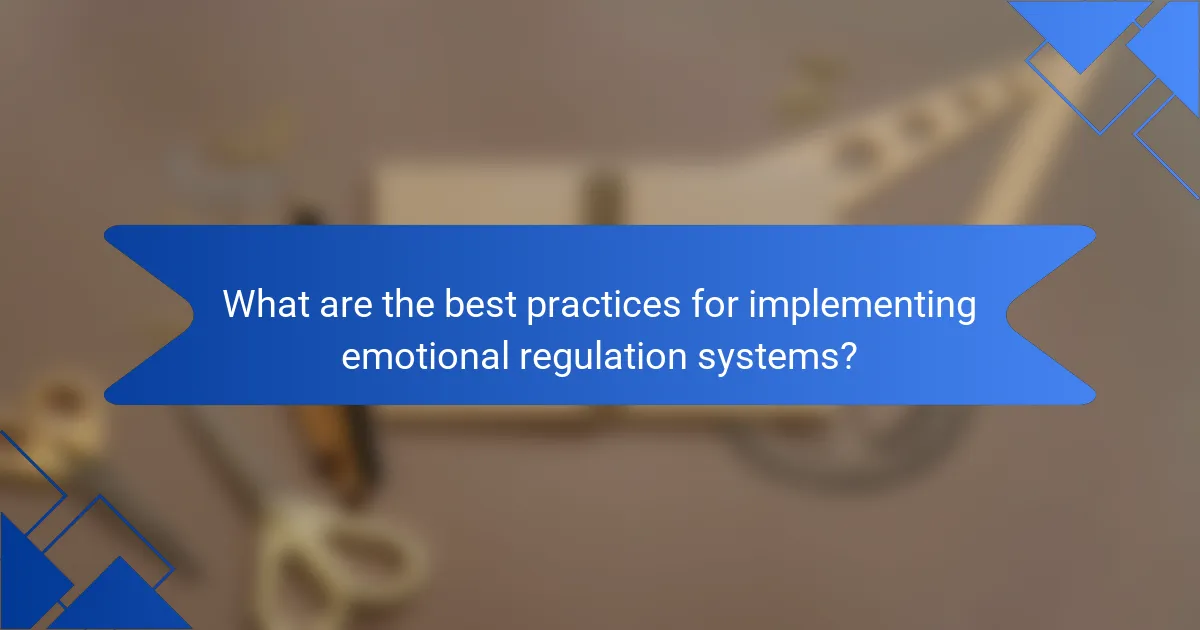
What are the best practices for implementing emotional regulation systems?
To implement highly intuitive emotional regulation systems, focus on training, integration, and feedback. First, provide athletes with training programs that enhance emotional awareness and coping strategies. Next, integrate these systems into daily practices, ensuring accessibility and consistency. Finally, establish a feedback loop to assess effectiveness and make necessary adjustments. These practices enhance performance, focus, and resilience in major sports.
How can coaches support athletes in emotional regulation?
Coaches can support athletes in emotional regulation by implementing structured strategies that enhance focus and resilience. Techniques such as mindfulness training, regular feedback sessions, and creating a supportive team culture foster emotional awareness.
Mindfulness practices help athletes recognize and manage their emotions, improving performance under pressure. Regular feedback sessions provide a platform for athletes to express feelings and receive guidance. A supportive team culture encourages open communication, allowing athletes to share challenges and develop coping strategies.
Additionally, coaches can model emotional regulation by demonstrating calmness and composure during competitions. This unique approach not only enhances individual athlete performance but also strengthens overall team dynamics.
What common mistakes should athletes avoid in emotional regulation?
Athletes should avoid common mistakes in emotional regulation to enhance performance and resilience. Key errors include neglecting self-awareness, failing to practice mindfulness, relying solely on external motivation, and ignoring the importance of emotional recovery. These mistakes can hinder focus and lead to burnout. Recognizing and addressing these issues fosters a more intuitive emotional regulation system, ultimately improving athletic performance.
What expert insights can enhance emotional regulation strategies?
Expert insights can significantly enhance emotional regulation strategies by integrating mindfulness techniques, cognitive restructuring, and biofeedback methods. Mindfulness practices improve athletes’ awareness of their emotions, leading to better self-regulation. Cognitive restructuring helps in reframing negative thoughts, fostering resilience. Biofeedback provides real-time data on physiological responses, enabling athletes to manage stress effectively. These approaches collectively enhance focus and performance in high-pressure situations, crucial for success in major sports.
